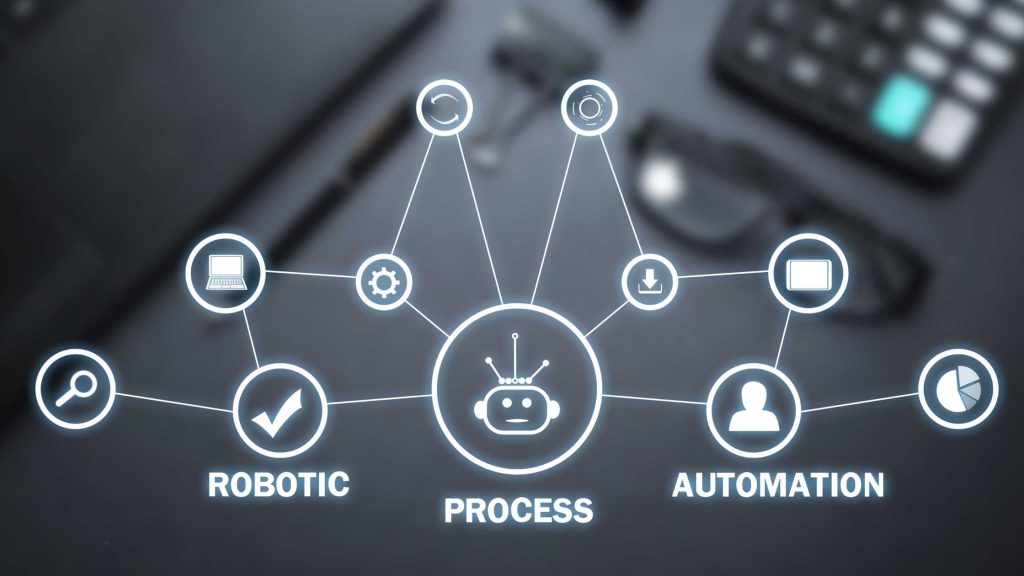Introduction
AI and Automation are laying the groundwork for the future of data management. Because enterprises now prefer to automate rather than rely on outdated methods of data processing, which are often inefficient and error-prone. As a result, the ability to process large volumes of data is paramount.
New automation technologies enable businesses to collect, structure, and analyze data in real-time. Instead, they can learn valuable intelligence, trends, and take action early, oftentimes before there are even problems to be reported.
Plus, other corporate automation powered by AI has made the processes more efficient and encouraged initiative. All functions win when decisions are guided by precise, automated intelligence from sales and marketing to compliance and finance. Companies are doing a lot more than just storing this data now, as they use it to gain a competitive edge everywhere from sales and marketing to compliance, to finance.
Business process automation AI is the step your company should take if it is still operating with manual processes. This way will originate more intelligent decisions and systemic growth.
Automating Insights: Turning Raw Data into Business Intelligence
Automating BI involves exploring, gathering, and generating knowledge or intelligence from raw data. Businesses can go beyond static reporting and receive real-time intelligence, which enables more intelligent decision-making through AI business process automation.
In other words, there is no need for analysts to be searching among reports or attempting to make sense of sheets, since AI systems can now scan, process, and analyze vast quantities of data in seconds. For the operations, finance and sales, and marketing divisions to use, it translates varied unstructured data into structured information.
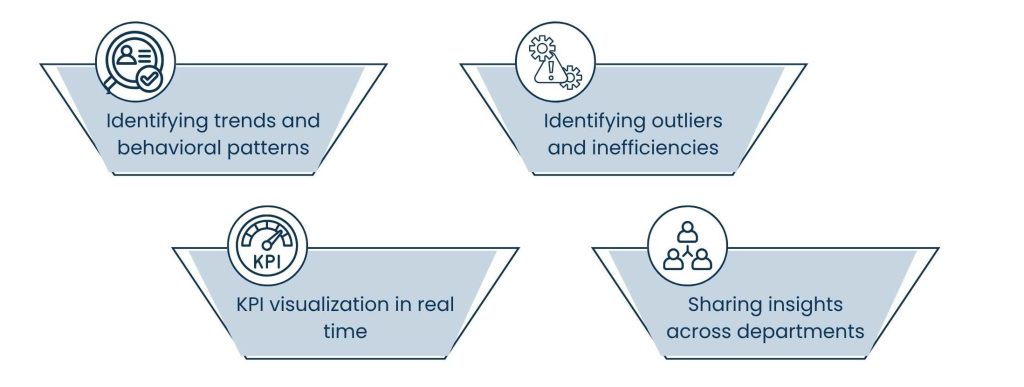
The leading Automation AI systems provide the following capabilities:
Identifying trends and behavioral patterns
It studies customer behaviour, purchase cycle, and engagement to surface trends before they emerge, giving product and marketing teams a head start.
Identifying outliers and inefficiencies
Automation catches system constraints or clerical exceptions that might get missed until they become more problematic.
KPI visualization in real time
Dashboards refresh automatically and show the latest performance measures for leaders to monitor operations on a real-time basis.
Sharing insights across departments
Data warehouses no longer exist. AI-enabled platforms aggregate and share research findings with teams in need, which also helps them in responding effectively and efficiently.
These benefits help reduce delays caused by laborious data extraction and slow reporting cycles. Insight provision also becomes a continuous, dynamic process with AI-driven automation for business.
An e-commerce company could use AI to study customer behavior on flash deals. By detecting trending products and other useful insights, it enables the team to adjust real-time promotions in seconds.
Capital isn’t the only category of businesses that can generate this kind of insight. SMBs (small to mid-sized businesses) are now able to utilize automation and AI-driven technology to access business intelligence information that was out of reach when the technology was only available on scalable, cloud-based platforms.
Get Predictive: Accurate Forecasting with AI-Driven Predictive Analytics
In dynamic markets, legacy methods are typically based on fragile human calculations and historical means. AI and automation let companies move from reactive planning to proactive planning.
AI-based business process automation can help businesses to analyse large amounts of structured and unstructured data from various sources like financial reports, supply chain logs, sales data, customer behaviours, etc, in order to provide accurate predictions. Companies are using this level of forecasting to change how they manage risk, allocate resources, and prepare to grow.
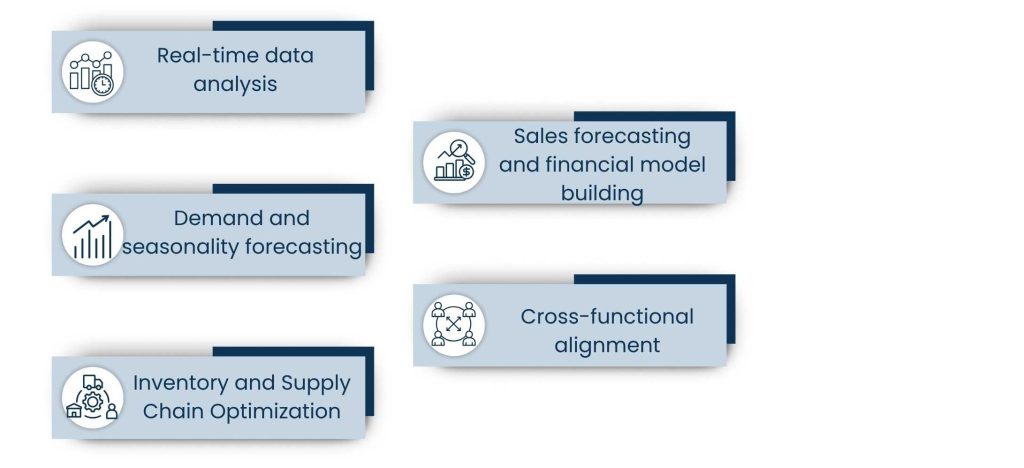
Here is how AI and automation for business intelligence are improving predictive forecasting:
Real-time data analysis
Because AI solutions can analyze live feeds of data to identify upcoming trends (instead of referring to historical performance only), squads can move more quickly to make decisions.
Demand and seasonality forecasting
AI algorithms can forecast demand changes due to previous purchase cycles, promotions, and customer habits, and they are applicable in e-commerce, retail, hotels, and other fields.
Inventory and Supply Chain Optimization
AI-based prediction systems save money for businesses and make customers happier by forecasting when you’ll need to restock and clearing stockouts.
Sales forecasting and financial model building
The financial department utilizes business process automation AI to anticipate potential cash flow scenarios, identify spending patterns on the spot, and adjust budgeting plans in real time.
Cross-functional alignment
The predictions made by AI software can be spread across departments so that marketers, sales staff, the operations team, and senior managers all operate off the same forward-looking data.
Imagine a shipping firm that deploys an AI forecasting program. It continuously studies delivery times, gas prices, weather conditions, and the behavior of drivers. With that data, the system predicts accidents, future delays, helps reroute shipments, and automatically optimizes labor scheduling without any human help.
AI and automation help you prepare better to plan, have less waste, and be more agile, especially in uncertainty or turbulence. That makes AI a strategic asset rather than a luxury. Businesses adopting AI automation are the smart ones, shaping the future.
Easing Compliance Burdens: AI To Keep You Audit-Ready
No one enjoys regulatory compliance; it’s one of the trickiest parts of running a business. With ever-evolving industry-specific regulations and laws, who can keep up with PCI, GDPR, and HIPAA compliance updates? Keeping up with it all manually is time-consuming and prone to error. Hence, anything involving automation/AI is a particularly good fit in this case.
Not only are today’s AI business process automation systems designed around the baseline requirements of compliance, but they are also built to expect and react to new regulations. Businesses can now be in real-time compliance, effortlessly, every second of the day, instead of reacting to audits or legislation being introduced.

This is how business AI and automation reduce risk and make compliance processes easier:
Automated data classification
AI solutions protect data that is regulated or sensitive by recognizing and classifying sensitive data throughout the data stores and systems in which it resides.
Constant observation and recording
Every access, change, and transfer of data is automatically tracked by AI systems, with no need for repeated audits or human beings to compile detailed audit trails.
Access control and permission management
AI-powered platforms oversee and remove user permissions according to role, location, or behavior to guard against insider threats and unauthorized access.
Real-time alerts for non-compliance
Smart systems alert administrators at once if there is a policy breach, for example, unencrypted data transmission, out-of-date access credentials, or access denied.
Policy automation and updates
Compliance policies can be automated so AI tools can follow them and adjust as new laws pop up, making sure your team is a step ahead of the legal must-dos.
For example, a doctor who is using AI-driven compliance tools can encrypt patient data automatically, restrict access to specified staff, and produce compliance reports as needed. Apart from the compliance with HIPAA, this will also save hours on the documentation and keep track of the hard copies of the handbooks.
Companies are deployed everywhere around the world, which is making compliance a part of their everyday operations with the assistance of AI and business process automation to reduce human errors, missed deadlines, and botched audits. They also build confidence among partners and customers, who expect transparency and ethical guidance in information handling.
That is to say: AI and automation turn compliance from something that’s a laborious one-thing-after-another pain in the butt, into something that is both proactive and seamless. This compliance framework, powered by AI, is preparing firms for audits. Companies that use AI-based compliance programs are not only audit-ready; they’re also more secure, more agile, and enabled to grow securely in highly regulated industries.
Competitive Edge with AI Business Process Automation
In the era of data, the companies that win will not be the ones that acquire the most data but the ones that make the best decisions the fastest. AI business process automation across all operations offers companies speed, accuracy, and scalability at an affordable price.
While outdated tools simply follow rules, data-driven AI automation adapts to change and continually improves results. This makes it a strategic asset, not simply a technical tool.
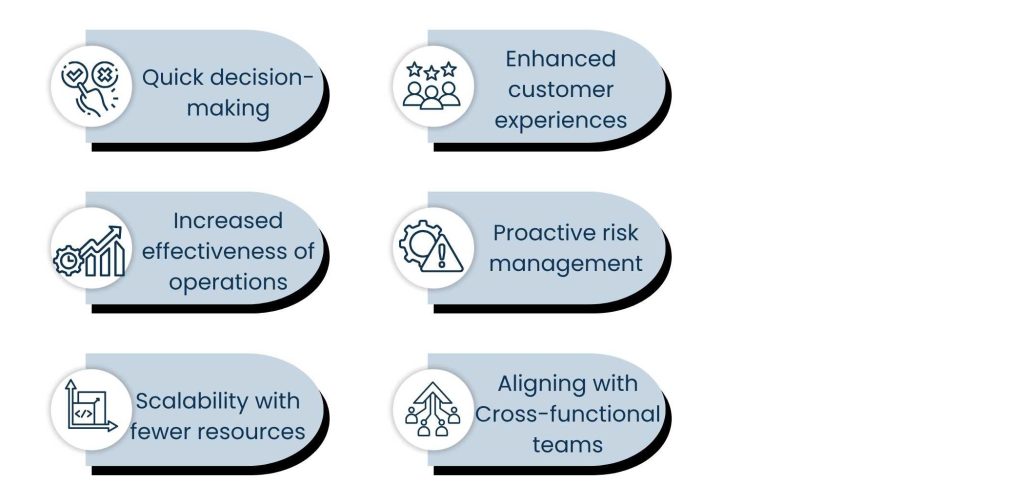
Here are a few ways in which business AI and automation deliver a sustained benefit to businesses going forward:
Quick decision-making
Teams can react to operational shifts, client demands, and market conditions with constant insights and analytics.
Increased effectiveness of operations
Individual and repetitive work can be done in fragments to reduce working man-hours without mistakes in entry.
Scalability with fewer resources
As your company grows, AI systems grow effortlessly, without having to add staff or infrastructure in proportion.
Enhanced customer experiences
AI-calibrated automation personalized responses, speeds up service, and anticipates customers’ needs, increasing loyalty and satisfaction.
Proactive risk management
Predictive analytics detects problems from supply shortages to security threats before they worsen.
Aligning with Cross-functional teams
Single platforms optimize processes, grant departments visibility into data in real-time, and maintain them aligned with business objectives.
Consider a SaaS company that is using business process automation AI to improve employee onboarding. AI solutions handle repetitive tasks by role, region, or customer tier, providing you with a totally smooth overall experience for your internal squads and end users.
Automation compounds provide productivity and cost savings gains over time. Even more importantly, firms are more fleet-footed, taking advantage of new opportunities and handling threats with precision and speed.
It’s not efficient to have AI run at the core of your business operations today; it’s revolutionary. That foundational layer you build for continued growth and dominance in your market is the adoption of AI and automation early.
It’s not about replacing humans; it’s about freeing them up to focus on the work that takes the business forward.
Security and Ethical Implications of AI Data Automation
It’s critical to be aware of the duties related to AI and automation. Particularly as information is often managed through automation and artificial intelligence (AI). Despite the obvious impact of AI on efficiency and intelligence, there are many concerns about AI, including algorithmic fairness, data privacy, and accountability of the system. AI business process automation must be successful with technology, deploying it in transparent, safe, and ethical ways.
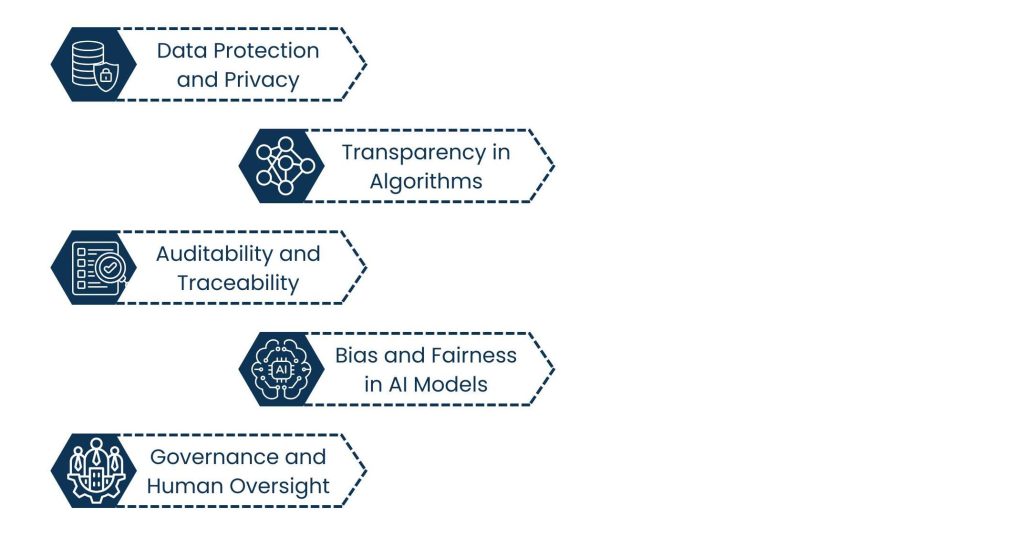
The following are the key areas, need to be focused on:
Data Protection and Privacy
An AI system can consume masses of data, especially sensitive information about people’s health, wealth, and personal lives. But we must continue to safeguard the data for privacy. Rules are defined for collecting, processing, retaining, and accessing data. To be compliant with things like the CCPA or the GDPR, or the HIPAA, companies also have to be able to at least encrypt and control access to data, and ideally anonymize it too.
Transparency in Algorithms
Most of the AI programs are “black boxes,” meaning their users find it difficult to understand their internal workings. Especially when money is involved, this opacity is equated with a lack of credibility. Explainable AI products that make models and predictions interpretable to users, auditors, and regulators should be high priorities for companies.
Auditability and Traceability
For companies, there should be some infrastructure to trace the actions, the decisions, and the flow of data. Audit trails also help enforce accountability by keeping track of which algorithms made what judgments, what data they relied on, and when they took action. They are particularly important in regulated and automated compliance applications.
Bias and Fairness in AI Models
Biased AI models can learn biases from their training data and come to produce unfair outputs. In order to ensure fair deployment, companies must continually test and audit models across various user types for fairness. Sourcing a range of data, ongoing monitoring, and diverse design practices are crucial.
Governance and Human Oversight
The idea is for AI systems to aid human decision makers in difficult or perilous situations, not to make them redundant. Human-in-the-loop processes ensure that the problem-solving is thoughtfully and ethically considered concerning critical business processes.
Business processes can’t be automated with AI without good procedures, responsible governance, and an open culture. Organizations that address security and ethical handling of information in the era of “big data” both mitigate risk exposure and work to remediate and establish long-term trust with stakeholders, customers, and regulators.
Conclusion: AI and Automation turning your data into your strategy
This will only get larger and more complex, and organizations cannot wait until their old-fashioned systems and hand-done processes change. AI and automation-driven tools automate forecasting, data management, organizing, and data analytics at scale and compliance tracking.
Competing and outpacing their competitors in terms of growth and success is something else companies can achieve using AI and business process automation. Automation and AI are now not a requirement, but a necessity for a successful digital strategy in this world where speed, intelligence, and trust are elements that define the fabric of success.
About Us
Tasks Expert offers top-tier virtual assistant services from highly skilled professionals based in India. Our VAs handle a wide range of tasks, from part time personal assistant to specialized services like remote it support services, professional bookkeeping service etc. Furthermore, it helps businesses worldwide streamline operations and boost productivity.
Ready to elevate your business? Book a Call and let Tasks Expert take care of the rest.





